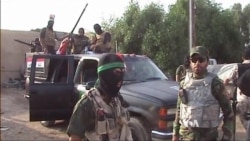In recent months, Islamic State fighters have overrun Iraqi forces in the western part of the country, capturing nearly all of Anbar province while trying to carve out a path to Baghdad.
While the U.S. military said the Iraqi capital is not under "imminent threat," officials are concerned the militants' gains in Anbar will provide the means for an assault on Baghdad’s perimeter.
Despite resistance from Iraqi troops and various militias, as well as coalition air strikes, the Islamists have been able to carry out attacks on locations near Baghdad, including the district of Abu Ghraib, a mostly Sunni suburb that is only about 25 kilometers from Baghdad International Airport.
Thus far, IS has been largely out of firing range of Baghdad, although sporadic mortar shells have landed in the capital.
Arab media reported that militant fighers attacked outlying areas of Fallujah on three sides Thursday but were repelled by members of the Abu Aissa tribe. Arabiya TV reported 100 IS militants were killed. VOA could not confirm the number.
Iraq's Ashirqiya TV said government helicopters and field artillery pounded Fallujah — controlled by the militants — and outlying areas.
Iraqi government TV added that security forces and Shi'ite volunteers had surrounded IS militants in the town of Jurf as Saqr, south of Baghdad.
Rand Corp. analyst Rick Brennan said the Sunni militants' goal is to push into the "Baghdad Belts," areas of access to the capital. But he said Bagdad’s large Shi’ite population makes it unlikely that they can capture the city — for now.
"What they are capable of doing is to infiltrate into certain areas, perhaps gain sympathies of certain portions of the Sunni population on the western side and increase the levels of violence in Baghdad to make it a much more dangerous place than it is today," Brennan said.
Iraqi Prime Minister Haidar al Abadi told a press conference Friday in the mostly-Shi'ite town of Karbala, south of Baghdad, that it is necessary to “unite forces” and use the best trained units to repulse the IS militants.
He insisted army units that were not performing well would be withdrawn from strategic locations and replaced with those that were more competent. He also asked Iraqi citizens to be patient with any security measures put in place to defend the country.
Suicide attacks increasing
But tensions have been rising in Baghdad, where the Islamic State has carried out a wave of deadly car bombings in mostly Shi'ite areas. Brennan said such attacks are meant to erode Iraqis’ trust and confidence in their government.
Jessica Lewis of the Institute for the Study of War said IS militants are determined to "bring the fight to Baghdad." But, like Brennan, she doubts that the group has the military capability to control the city.
"And I’m not entirely convinced that they feel the need to control it right now because they seem to be developing objectives that are incredibly concrete and within their capacity," she said, noting that the group is using tactics such as suicide attacks once employed by its predecessor, al-Qaida in Iraq.
Some 60,000 Iraqi troops are now positioned outside Baghdad, including at the airport, trying to stop Islamic State fighters from advancing on the city.
Iraq's ambassador to the United States, Lukman Faily, said the government is aware of the situation's urgency.
"We are extremely concerned in relation to the areas which have been taken by ISIS or areas which they are threatening to even, as you said, even the bombardment of that area," Faily said.
"Obviously, on daily [basis], we still have suicide bombings and so on … it’s a multilayer warfare. It’s unconventional warfare, so the situation is not taking control of land but having preemptive actions by the government to make sure that the safety of people is paramount."
Iraqi army ‘ineffective’
The U.S. military said Thursday that Iraqi forces are "months" away from a major offensive to retake territory lost to the Islamic State.
Iraqi Kurdish militia fighters known as peshmerga are preparing to travel to the Syria-Turkey border to defend the city of Kobani against the IS fighters, but according to U.S. Central Command officials, a sustained ground offensive in Iraq will require more time.
A military official, speaking on the condition of anonymity, said an offensive is “not imminent. But we don't see that that's a years-long effort to get them to a place to where they can be able to go on a sustained counter-offensive."
Brennan, agreed, saying it will be some time before Iraq's army can undertake major offensives to push the Islamists back because, as he put it, about half of the army is "combat ineffective."
"But as you start growing those capabilities and, together with the coalition efforts, together with the air assets that we’re bringing, possibly at some point in the future perhaps integration with U.S. special operations, that could help them move along the lines," he said.
Iraq's recently appointed defense minister, Khaled al Obeidi, said Friday he would work “to rebuild and restructure” the Iraqi military. Iraqi TV reported that Obeidi spoke with U.S. counterpart Chuck Hagel on Thursday.
President Barack Obama has ruled out the deployment of U.S. ground troops to Iraq and Syria. But there is a growing feeling in Washington that the Islamic State can be defeated only if foreign ground troops become part of the fight.
VOA's Edward Yeranian contributed to this report from Cairo.













